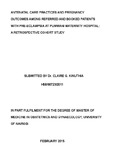| dc.contributor.author | Kinuthia,Claire G | |
| dc.date.accessioned | 2015-09-03T06:10:52Z | |
| dc.date.available | 2015-09-03T06:10:52Z | |
| dc.date.issued | 2015 | |
| dc.identifier.uri | http://hdl.handle.net/11295/90370 | |
| dc.description.abstract | Background: Hypertensive disorders are the most common medical complication
occurring in 12-22% of all pregnancies and contribute significantly to both maternal and
perinatal morbidity and mortality. Early identification and effective management in addition
to timely referral to higher level facilities for specialized management plays a significant
role in ensuring good maternal and perinatal outcomes. Despite the availability of
screening tools and management guidelines, severe pre-eclampsia and eclampsia
continues to be a major cause of severe maternal and perinatal complications especially
so in developing countries. Antenatal care is a key instrument in the detection of pregnant
women at high risk of developing pre-eclampsia and instituting proper management to
control the disease before complications arise.
Objective: To determine and compare the pregnancy outcomes of patients with preeclampsia
who received antenatal care at Pumwani Maternity Hospital and those who
received antenatal care at its referring health facilities.
Study design: A retrospective cohort study, where exposure of interest was antenatal
clinic attendance at Pumwani Maternity Hospital.
Methods: Study population consisted of 224 patients diagnosed with pre-eclampsia who
delivered at Pumwani Maternity Hospital from June 2009 to June 2014 in two equal
cohorts of 112 patients each, namely, those who attended ANC at Pumwani and those who
attended ANC at its referring health facilities. Data was extracted from patient records
using a structured questionnaire.
Results: Data was retrieved from a total of 224 patients files, 112 files were from patients
who received antenatal care at Pumwani Maternity Hospital and the other 112 files were
from patients who received antenatal care outside Pumwani Maternity Hospital. ANC
attendance at PMH was associated with development of fewer maternal complications
(12.5%) compared to attendance at its referring health facilities (26%) p-value=0.011.
There was no significant difference in neonatal outcomes in both cohorts with similar
newborn complications in both cohorts including admission to newborn unit at 50% in
Pumwani and 41.7% from its referring facilities and perinatal death of 8% from PMH and
10.6% from its referring facilities. ANC attendance at PMH was associated with better
screening, appropriate investigations and timely institution of medical management
compared to attendance at its referring facilities. Antenatal care practices contributed most
significantly towards the development of adverse pregnancy outcomes.
Conclusion and Recommendations: Antenatal care practices play a significant role in
the early diagnosis and management of pre-eclampsia thus greatly affecting pregnancy
outcomes. Facilities at all levels in the health care system (level 1-6) require targeted
support to improve their antenatal service provision for management of pre-eclampsia
especially so for lower level facilities (level 1-4) that cater for the majority of pregnant
women in the community. | en_US |
| dc.language.iso | en | en_US |
| dc.publisher | University of Nairobi | en_US |
| dc.title | Antenatal care practices and pregnancy outcomes among referred and booked patients with pre-eclampsia at Pumwani maternity hospital:A retrospective cohort study | en_US |
| dc.type | Thesis | en_US |
| dc.description.department | a
Department of Psychiatry, University of Nairobi, ; bDepartment of Mental Health, School of Medicine,
Moi University, Eldoret, Kenya | |
| dc.type.material | en_US | en_US |

